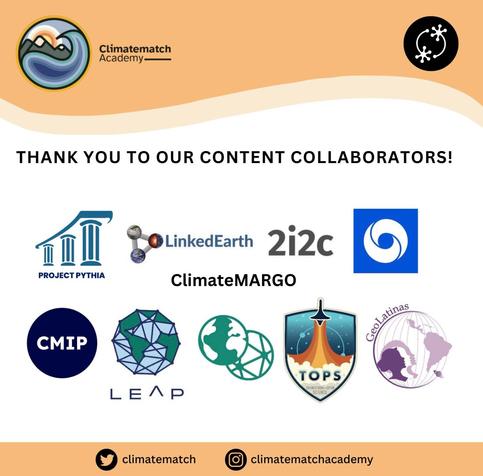Thank you to all our collaborators listed below who have helped create content for Computational Tools for Climate Science!
It wouldn't have been possible without your incredible contributions 💯🎉
@ProjectPythia is an educational resource for the entire geoscience community, providing open-source, Python-centered learning materials. 🐍 #ProjectPythia
@Linked_Earth has been instrumental in collecting and analyzing valuable data, helping us understand our changing planet. 🌎 #LinkedEarth
The Coupled Model Intercomparison Project (CMIP) is a collaborative framework designed to improve our knowledge of climate change, facilitating multi-model comparisons and making data publicly available. 📊 #CMIP
ClimateMARGO provides a framework for optimizing climate change control strategies, bridging the gap between climate science and policy-making. 💚 #ClimateMARGO
Learning the Earth with Artificial Intelligence and Physics (LEAP) is merging climate science expertise with cutting-edge machine learning algorithms, advancing near-term climate projections. ⚡️ #LEAP
@ClimateChangeAI is an organization that brings together experts from academia, industry, and beyond, harnessing the power of machine learning to tackle climate change. 🤝 #ClimateChangeAI
@2i2c_org is a non-profit project of Code for Science and Society, fostering open communities and leveraging expertise in cloud engineering and open source to advance research, education, and collaboration worldwide. 🌍 #2i2c
@GeoLatinas is an empowering community dedicated to embracing, promoting, and inspiring Latinas in pursuing and thriving in careers in Earth and Planetary Sciences, providing tools, inspiration, and bridging gaps for success in the field. 🌎 #GeoLatinas
@GoogleDeepMind is at the forefront of artificial intelligence research addressing complex challenges and driving innovation across various domains, including climate science. 🤖#GoogleDeepMind
@NASATOPS is a transformative initiative driving the adoption of open science principles to create a more accessible and equitable scientific culture. 🚀#NASATOPS
We're grateful for your incredible contributions. Together, we're making a significant impact in understanding and addressing the challenges of climate change. 💚
